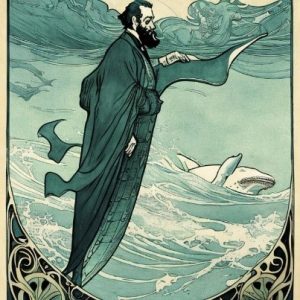 “Maybe you noticed that most of my songs are traditionally rooted. I don’t do that on purpose. Charley Patton’s 30’s blues has made a deep impression on me and High Water (for Charley Patton) is, in my opinion, the best song of this record,” says Dylan at the Rome press conference, July 2001.
“Maybe you noticed that most of my songs are traditionally rooted. I don’t do that on purpose. Charley Patton’s 30’s blues has made a deep impression on me and High Water (for Charley Patton) is, in my opinion, the best song of this record,” says Dylan at the Rome press conference, July 2001.
I do agree. Well, ex aequo with “Mississippi”, anyway. Both songs open the floodgates (no pun intended), and “High Water” belongs in the same outer category as “Desolation Row”, “Mississippi” and “I Contain Multitudes”; extremely rich, poetic, Nobel Prize-worthy musical gems. Lovely, lovely song.
——————
“Because the whale is not wicked. He doesn’t bite. And their gods had to bite. He’s not a dragon. He is Leviathan. He never coils like the Chinese dragon of the sun. He’s not a serpent of the waters. He is warm-blooded, a mammal. And hunted, hunted down.
It is a great book.”
 D.H. Lawrence is a fan. And doesn’t hide it. “One of the strangest and most wonderful books in the world,” he writes in Studies in Classic American Literature (1923), in his essay on Moby-Dick or The Whale, the same essay from which the above quote comes. In which, incidentally, the Dylan follower will also be struck by the remarkable similarity to Dylan’s narrative style in prose. As in The Philosophy Of Modern Song (2022), the writing style of virtually every introduction to the 66 essays;
D.H. Lawrence is a fan. And doesn’t hide it. “One of the strangest and most wonderful books in the world,” he writes in Studies in Classic American Literature (1923), in his essay on Moby-Dick or The Whale, the same essay from which the above quote comes. In which, incidentally, the Dylan follower will also be struck by the remarkable similarity to Dylan’s narrative style in prose. As in The Philosophy Of Modern Song (2022), the writing style of virtually every introduction to the 66 essays;
“Perry is also the anti–American Idol. He is anti–flavor of the week, anti–hot list and anti-bling. He was a Cadillac before the tail fins; a Colt .45, not a Glock; steak and potatoes, not California cuisine. Perry Como stands and delivers. No artifice, no forcing one syllable to spread itself thin across many notes.”
… to Perry Como’s “Without A Song”. Or in “Tutti Frutti”: Little Richard was anything but little. He’s saying that something is happening. The world’s gonna fall apart. He’s a preacher. “Tutti Frutti“ is sounding the alarm. The same ebb-and-flow rhythm as D.H Lawrence, that same attractive tension between the short, forceful and bare-bones sentences with a minimum of adjectives or even adverbs on the one hand, and the baroque abundance of the evoked images, the surprising metaphors and their alienating connotations on the other.
And we see, coincidentally of course, an amusing substantive parallel with a striking verse from the penultimate stanza of “High Water”. While Fat Nancy puts the narrator in his place with the bitchy “As great as you are, man, you’ll never be greater than yourself,” D.H. Lawrence says of Herman Melville: “The artist was so much greater than the man” – apparently, the writer of Moby-Dick can be greater than himself.
We owe the discovery of Melville’s surfacing in “High Water” to Albuquerque-based Supreme Source Finder Scott Warmuth. Following the disclosure of manuscripts and draft versions by the Bob Dylan Center in Tulsa, fans and Dylanologists are confronted with yet another challenge: deciphering crossed-out passages, half-words and Dylan’s often illegible cramped, scrawly handwriting. Firstly, of course, the excerpts featured in Mixing Up The Medicine – after all, these are accessible to all.
The verse from a draft version of “High Water” pictured (presumably a second version) is quite a nut to crack for the esteemed ladies and gentlemen analysts. Especially the hieroglyphs at the top right:
“You dont have a wreathe of agitation rippling on your face,” sees one, “You xxx have a life of agitation rippling on your farm,” a next one suspects, and “You don’t have a world of agitation rippling on your face” reads the third. Warmuth is not only the only one who can decipher it, but also immediately finds its source: it is “You don’t have a wrinkle of agitation rippling on your face” and it is a barely rebuilt paraphrase:
“I looked at him steadfastly. His face was leanly composed; his gray eye dimly calm. Not a wrinkle of agitation rippled him. Had there been the least uneasiness, anger, impatience or impertinence in his manner; in other words, had there been any thing ordinarily human about him, doubtless I should have violently dismissed him from the premises.”
… from one of Melville’s Piazza Tales, from the brilliant “Bartleby, the Scrivener: A Story of Wall Street”, written in 1853. A baffling birth year, by the way, and it may explain why the short story was so lukewarmly received at the time: Melville was more than half a century ahead of his time. In his time at most reminding of Gogol, but similarities to twentieth-century grandmasters like Kafka and Camus stand out much more clearly. Not only because of the composition – an otherwise rather colourless narrator sharing with us his observations of the eccentric, irrational office clerk Bartleby – but mainly because of the plot: Bartleby slowly but consistently shirks the responsibilities expected of him, justifies this exclusively with the enigmatic “I would prefer not to”, is somehow unremovable and is eventually taken away by the police. In prison, he refuses to eat and dies after a few days. Very Kafkaesque, Melville then offers a short coda – which, however, does not offer the expected key, but only raises more questions.
Not only is the plot similar to a Kafka story like Die Verwandlung (The Metamorphosis) or Dylan songs like “Drifter’s Escape” and “The Ballad of Frankie Lee and Judas Priest”, we also recognise the style: the clear, straightforward prose that superficially suggests a deceptive transparency, and beneath that clear surface an enigmatic, alienating undercurrent. Extra camouflaged by humour; as with Kafka and Gogol and Dylan, Bartleby’s answers and actions are initially laughable, tickle our funny bone. The underlying, unknown but unmistakably present tragedy only seeps through at second glance. It’s a connection to John Wesley Harding songs which Dylan himself seems to recognise: at the Night of The Hurricane concert in New York (8 December 1975), he announces “I Dreamed I Saw St. Augustine”, the only John Wesley Harding song of the evening, with “Here’s a song, I want to dedicate this to Mr. Herman Melville.”
Thus, Scott Warmuth exposes the first clearly verifiable, irrefutable example of Melville influence on “Love And Theft”. Melville’s presence was always palpable, but not that categorically identifiable, was more or less traceable in remarkable word choice. In No 8 of the album, “Moonlight”, for example. The clouds are turnin’ crimson we find in Melville’s Mardi (twice), as do such undylanesque idioms as trailing moss, cypress, mystic glow, groan and petals; words and word combinations that we otherwise rarely, if ever, find with Dylan, but all are found in Melville’s novel.
As we find typical “Melville words” like dazzling and squall in No 6, “Floater”, as we notice phrases like “golden haze”, “silent sun” and “beams of light” in the Time Out Of Mind-outtake “Dreamin’ Of You”; unusual with Dylan, but all found in Melville’s Collected Works. And as a bonus, we then find another likely, and slightly absurd source for the depth measurement in the opening line of the fourth stanza, “High water risin’, six inches ‘bove my head”, in that same perfect short story “Bartleby, the Scrivener”, a few pages after the wrinkle of agitation fragment:
“He did not look at me while I spoke, but kept his glance fixed upon my bust of Cicero, which, as I then sat, was directly behind me, some six inches above my head.”
We could rule out the coincidence factor anyway since “’Cross The Green Mountain”, Dylan’s masterful contribution to the soundtrack of Gods And Generals (2003) – in it, Dylan copies a couple of verse excerpts from Melville’s poem “The Scout Towards Aldie” (brave blood to spill and the ravaged land was miles behind) – but Melville, thanks to Warmuth, is now retroactively demonstrable even before that, in the creation phase of “Love And Theft”. And, leafing through the Collected Works, discernible. Identification Dylan should have felt with the narrator of “Bartleby, the Scrivener”. I was not unemployed in my profession by the late John Jacob Astor; a name which, I admit, I love to repeat; for it hath a rounded and orbicular sound to it, and rings like unto bullion he says already on page 1 – demonstrating an identical, almost synaesthetic sense of sound as Dylan has. And confirmation Dylan should have found with a conception of art that Melville articulates in Redburn:
“And for me, I should be charged with swelling out my volume by plagiarizing from a guide-book – the most vulgar and ignominious of thefts!”
… in his mind, Dylan will have registered a kinship with his fellow thief of thoughts and put a tick in the margin with a collegial nod. Perhaps even a wrinkle of agitation rippled him.
To be continued. Next up High Water (For Charley Patton) part 23: Love and Theft
Jochen is a regular reviewer of Dylan’s work on Untold. His books, in English, Dutch and German, are available via Amazon both in paperback and on Kindle:
- Blood on the Tracks: Dylan’s Masterpiece in Blue
- Blonde On Blonde: Bob Dylan’s mercurial masterpiece
- Where Are You Tonight? Bob Dylan’s hushed-up classic from 1978
- Desolation Row: Bob Dylan’s poetic letter from 1965
- Basement Tapes: Bob Dylan’s Summer of 1967
- Mississippi: Bob Dylan’s midlife masterpiece
- Bob Dylan’s Greatest Hits
- John Wesley Harding: Bob Dylan meets Kafka in Nashville
- Tombstone Blues b/w Jet Pilot: Dylan’s lookin’ for the fuse
- Street-Legal: Bob Dylan’s unpolished gem from 1978
- Bringing It All Back Home: Bob Dylan’s 2nd Big Bang
- Time Out Of Mind: The Rising of an Old Master
- Crossing The Rubicon: Dylan’s latter-day classic
- Nashville Skyline: Bob Dylan’s other type of music
- Nick Drake’s River Man: A very British Masterpiece
- I Contain Multitudes: Bob Dylan’s Account of the Long Strange Trip
- Bob Dylan’s Rough And Rowdy Ways – Side B
- Bob Dylan’s High Water (for Charley Patton)


Melville’s writing is discussed in the Tim Lott book ‘Love and Theft’ from which cribbed his album title. From memory he looks at racial ambiguity in a few passages of The Confidence Man.